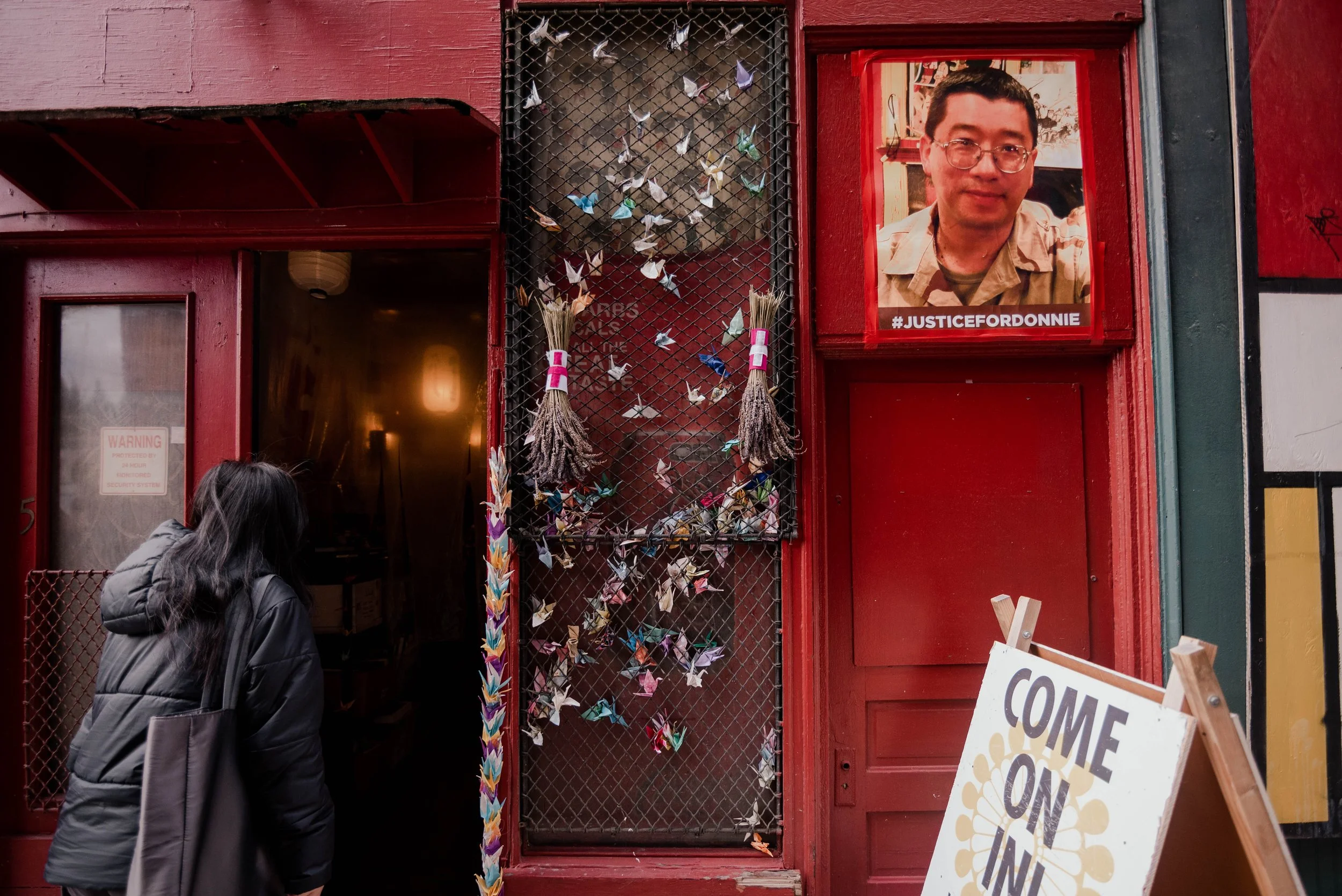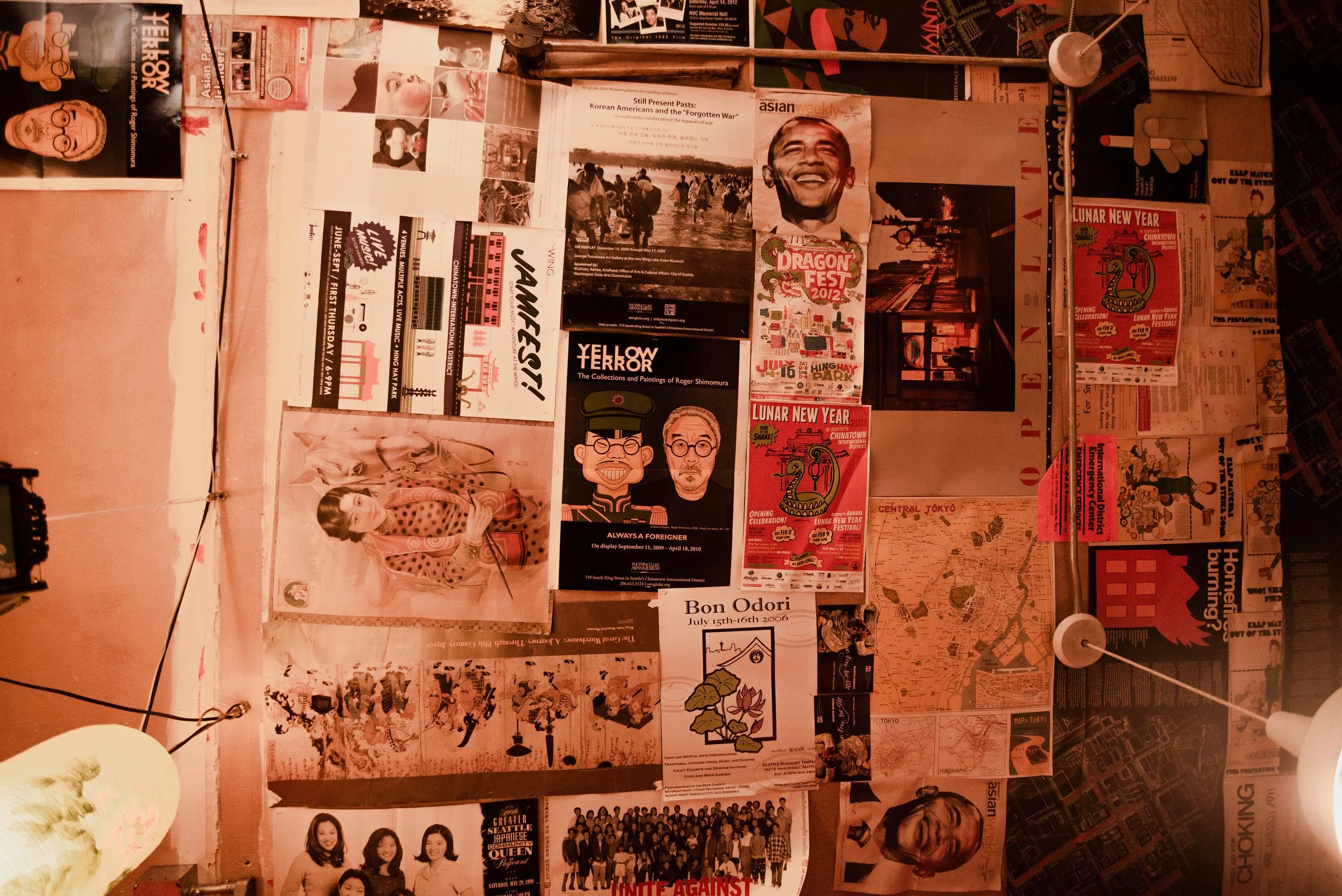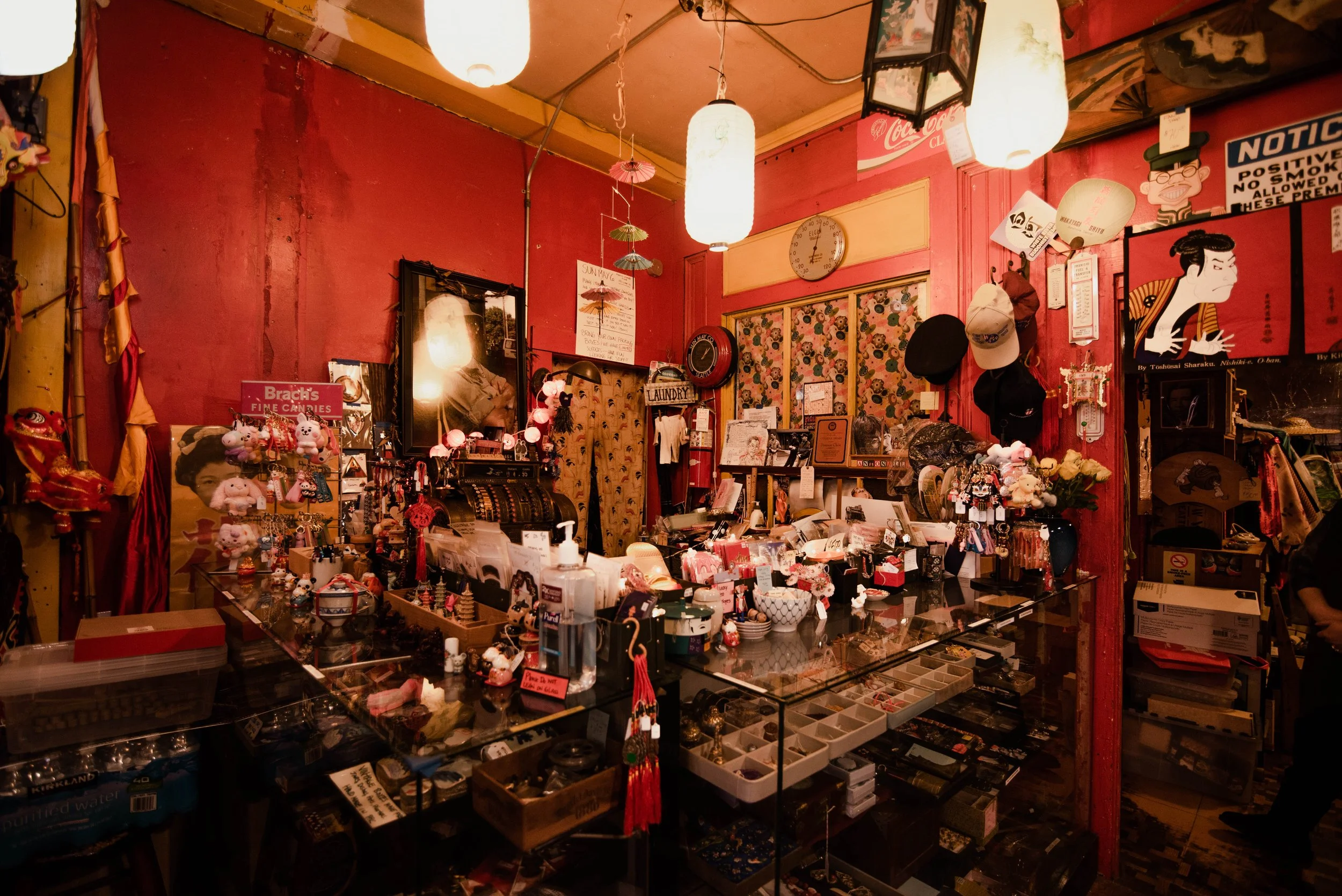A Thousand Cranes
Recollections from a profound conversation we happened upon unintentionally. Read on to hear the history of SunMay Co. and the inspiring story of Donnie Chin. We wish more people knew of his story and hope to share it with you :)
We were exploring Seattle’s Chinatown International District (CID) together for our final project for class when we happened upon an alleyway, and as Josh sat marveling at how clean the alleyway was- a rare sight in Seattle- we bumped into a friendly man who, seeing that we were students exploring the CID, pointed at a small antique shop down the clean alleyway and recommended we visit the shop, as the owner of the shop was a friendly lady, though she wouldn’t sell him the shop no matter how many times he offered to buy.
Pictured above: At the entrance to the small shop hung some paper origami cranes and a poster of the owner’s brother who was killed years ago.
As we approached the entrance of the shop, we noticed two things- the many beautiful paper origami cranes next to the door, and a large poster with the words “#JUSTICEFORDONNIE”. We peaked slowly through the door to see what was inside as we stepped in, and as the owner spotted us, she beckoned us to come in to look around. The shop was a cute and cozy little haven with an assortment of trinkets, bits of clothing and various antique pieces. At the heart of the store, there was a hefty antique cash register machine.
We explained we were exploring the CID for our final project and trying to dig into its roots a little more, which struck up a conversation we will never forget. It made our entire trip to the CID a very eye-opening one, and gave us a newfound appreciation for how deep the history runs in the CID. With permission from Connie Chin, the owner of the shop, to use these photos and to tell this story, I (Michelle) will try my very best to accurately recount the conversation that followed.
If you looked up, you could see posters on the ceilings collected over the years. I found one dated from 1999 up there!
The shop was old. Very old. Connie’s grandparents found it in 1911 and her parents took the reigns after her grandparents, with her mom continuing it until she was 82 years old. Now it was Connie’s responsibility to carry on the legacy. Her family has deep, deep roots in Seattle. Even her uncle opened a grocery store, which he later donated to the Wing Luke Museum.
She brought us into another room of the store and showed us faces to the names, remarking that she continues the legacy of the antique shop because though everyone is gone now, she still feels them here. She only opens the shop on Fridays, Saturdays, and Sundays though because the income from the shop alone was not sustainable, so she worked elsewhere during the week.
The hefty antique cash register machine that sat at the heart of the store was the same one her grandparents used in 1911 and she still maintains and uses it today.
Pictured above: At the center of the store sits a hefty antique cash register over which Donnie’s picture hangs. The register still works and Connie uses it to ring out purchases. Her grandparents used it back then too!
Connie had a brother. A picture of him hung above the cash register. She thought she would be sharing the responsibilities of the shop with him, but he was murdered by gang members a block from the shop seven years ago in 2015, and her eyes teared as she recounted his story and legacy. Here is the legacy of Donnie Chin:
Donnie grew up in the CID and since a young age, he found as many ways to help his CID community as best he could. As a kid, he would learn first-aid so he can help as best he could. And since the elders of the CID would often hang out in their usual areas in the neighborhood every day, if Donnie didn’t see an elder for a day or two, it was usually a sign that they were sick or in need of help. So, Donnie would find out where they were and help them. As he grew older, he worked closely with firefighters to help the individuals around CID, so closely that he became the first and only civilian to have a direct line to the firefighter department. Eventually, he trained to become a paramedic and even worked with Harborview doctors to create Medic One program to provide emergency coverage and services everywhere.
His heart remained with the CID, and so did he. If there was an emergency call in the CID, he would be the first person there, though he did not have a vehicle and just ran everywhere. Connie remembered getting to go with him once to answer a call, and finding that the bag he carried was so heavy- she was sure it was at least 40 pounds! Everyone in the CID knew him, and parents felt safe with him around. He taught the kids to give back to the community, and even now, some of those kids occupy office space a few doors down from the shop and found professions that will allow them to carry on his legacy of giving back to the community.
Donnie worked 24/7 and was never paid. He was irreplaceable and invaluable. His passion and selflessness were rare. When he died, at least 300 people came out to mourn his loss including the city’s firefighters, who took their fire trucks and crossed the trucks’ aerial ladders, one of the most visual and honorable tributes to remember their dead firefighters.
And when Connie came back to her shop after losing Donnie, she discovered that someone had filled her shop with 1,000 paper origami cranes, a Japanese symbol of hope and healing. To this day, she never found out who had made and given her those cranes, but people would drop off cranes to her every now and then, as she points to the origami cranes speckled across the shop.
Pictured above: Some of the cranes scattered around the store that people drop off.
Now, along with carrying on the legacy of the antique shop, she carries with her the legacy of her brother, Donnie Chin. The picture of him that sits above the cash register is so he could still watch over the store even in his passing, just as he watched over the CID in his life (and she added, laughing lightly, he was probably judging her too, as brothers and sisters do).
The legacy likely ends with her. She sighed as she said this. When she retires, she has no kids and no family to pass on the shop to. She hopes one day the Wing Luke Museum can take a small portion of the shop so a little part of it can live on forever, but she will be the end of the line.
When our conversation finished and we bid goodbyes, we walked out of the shop quietly, reflecting on the preciousness of the story Connie had told us.
One of the themes for the class we were taking is that stories we tell create our reality. And this was one heck of a story. As we were talking to each other about it, we realized we didn’t know what to do with it, but we knew that we now keep this story in our hearts. We all agreed that we wished more people knew of Donnie Chin’s legacy, because it is stories like these that inspire us. So we have chosen to retell this story to the best of our ability, and hope for the best. Thank you for reading.
Pictured above: More cranes people leave in front of the store in remembrance of Donnie Chin.







